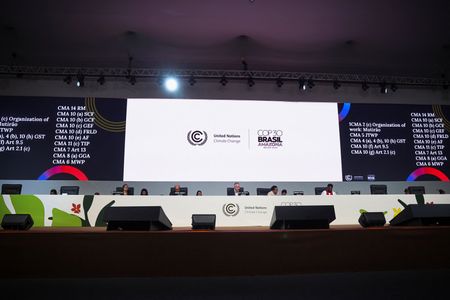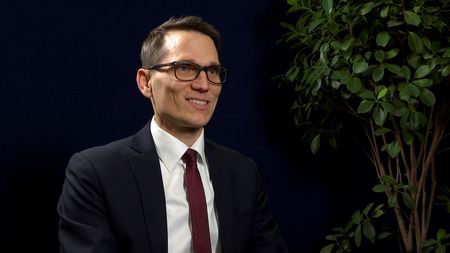By Manuela Andreoni
BELEM, Brazil (Reuters) -Brazil insisted on hosting this year’s COP30 climate summit in the Amazonian city of Belem to put rainforests at the heart of negotiations on how to curb global warming.
But as delegates from almost every country concluded tense talks under the rainforest’s humid heat, the outcome for trees and their guardians, though unprecedented, was bittersweet.
Countries unlocked billions in new funds for forests, and a record number of Indigenous delegates took part in the conference.
Still, even as the final agreement acknowledged that leaders were gathered at the heart of the rainforest, nations failed to agree on a plan to keep trees standing as they have repeatedly promised to do in recent summits, relying instead on a voluntary roadmap.
“There was enormous expectation that we could leave with something more concrete,” said Carlos Rittl, director of public policy at the nonprofit Wildlife Conservation Society. But, he added, the final agreement didn’t provide the answers “that the Amazon asked for, and that the world expected.”
The week in Belem opened with optimism. Germany pledged 1 billion euro to Brazil’s flagship Tropical Forests Forever Facility, the TFFF, which will support global conservation of endangered forests, boosting total contributions to nearly $7 billion.
But it closed on a sour note, with negotiators dropping a proposed roadmap to end deforestation from the final agreement, which would have required countries to show how they intend to meet the 2030 zero-deforestation pledge made two years ago at the Dubai climate summit.
“This was supposed to be the Forest COP. I’m not sure if it is the Forest COP today,” said Juan Carlos Monterrey Gomez, the head of the Panamanian delegation, hours after he learned the roadmap had been dropped.
Tropical forests, which hold huge amounts of planet-warming carbon, have never been in higher danger of disappearing along with the thousands of communities and animal and plant species that inhabit them.
Massive fires fueled by climate change led global forest loss to smash records last year, even as farmland continued to expand over trees in developing countries that hold the biggest areas of pristine forests.
Though global commitments on conservation have generally been left to the global biodiversity summit, historically a much less consequential forum, nature has been increasingly present in climate negotiations.
“Climate change and the loss of biodiversity are two sides of the same coin,” said María Heloísa Rojas Corradi, Chile’s minister of environment.
RECORD INDIGENOUS PRESENCE
Tropical forests got more money in Belem than at any other climate summit.
The Brazilian government still expects other countries, such as China and the United Arab Emirates, to announce contributions to the TFFF so it can reach $10 billion by the end of the year.
European countries also announced they were backing a $2.5 billion initiative to help protect the Congo Basin rainforest.
Having failed to get countries to agree on a roadmap to halt and reverse deforestation, Brazil’s COP30 presidency also put forward a voluntary roadmap, along with another one to transition away from fossil fuels, COP30 president Andre Correa do Lago said in the final plenary.
On the sidelines of the conference, different governments and companies also announced millions of dollars in new programs to make more forest-friendly beef, strengthen the supply chain of forest products, and more.
“For all those reasons, I would call COP30 a success for forests,” said Frances Seymour, a senior policy advisor at Woodwell Climate Research Center.
The so-called forest COP, she said, was also seen as a huge opportunity for Indigenous people to get a bigger seat at the table, partly because of their role in protecting threatened ecosystems like the Amazon.
No climate summit had ever hosted so many Indigenous peoples. Some 3,000 leaders from countries around the world were present, said Toya Manchineri, who heads the Coordination of the Indigenous Organizations of the Brazilian Amazon.
They had some victories that may also help keep forests standing.
Brazil announced the demarcation of 10 new Indigenous lands, covering almost 1,000 square miles, at COP30. And about a fifth of the TFFF forest fund is set to go to Indigenous peoples protecting forests.
Manchineri said he was disappointed that a proposal to include an item in the agenda to discuss formal recognition that the demarcation of Indigenous lands is a climate policy failed.
“But the fact is that we get out of here, as an Indigenous movement from the Amazon, a lot stronger,” he said.
(Reporting and Writing by Manuela Andreoni; Editing by Katy Daigle and Nick Zieminski)










